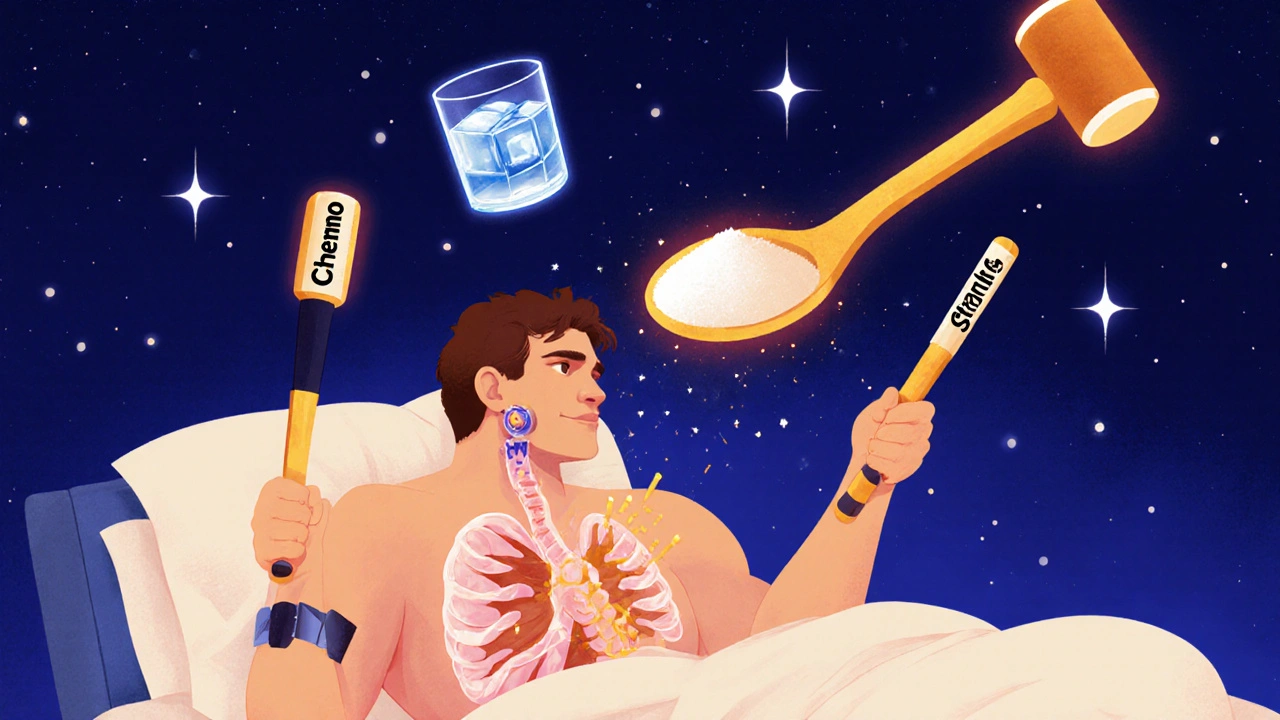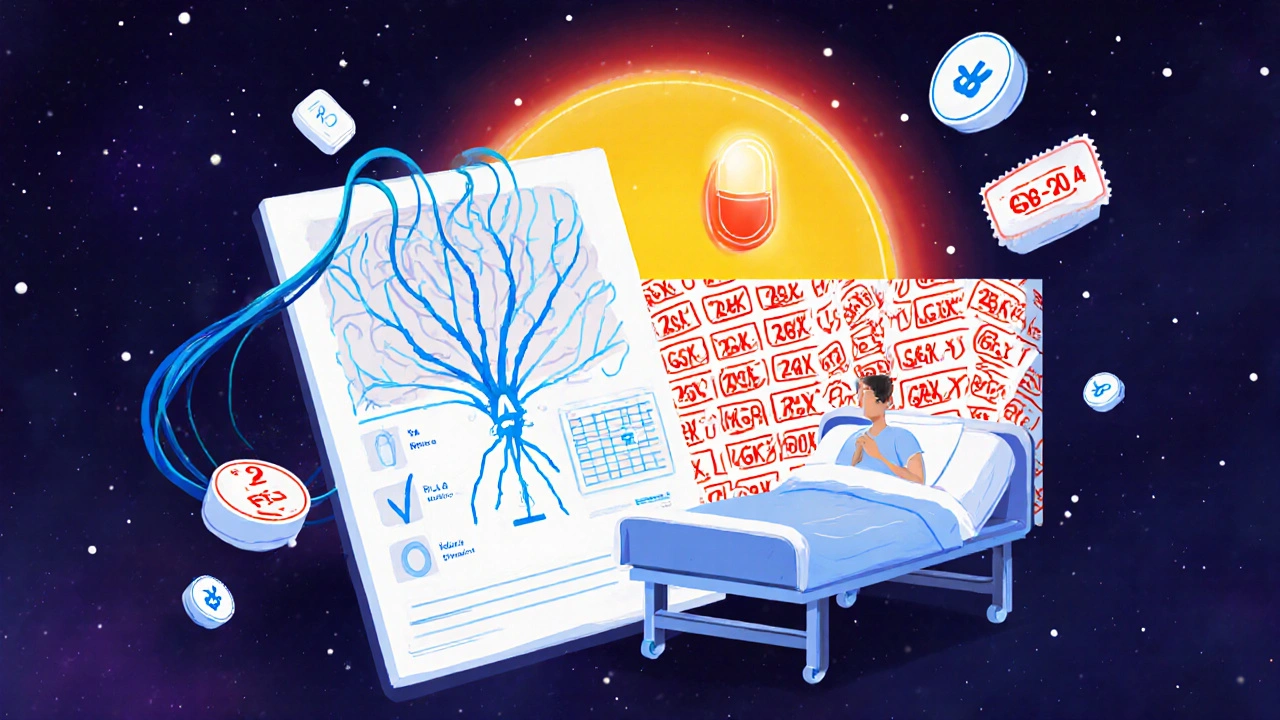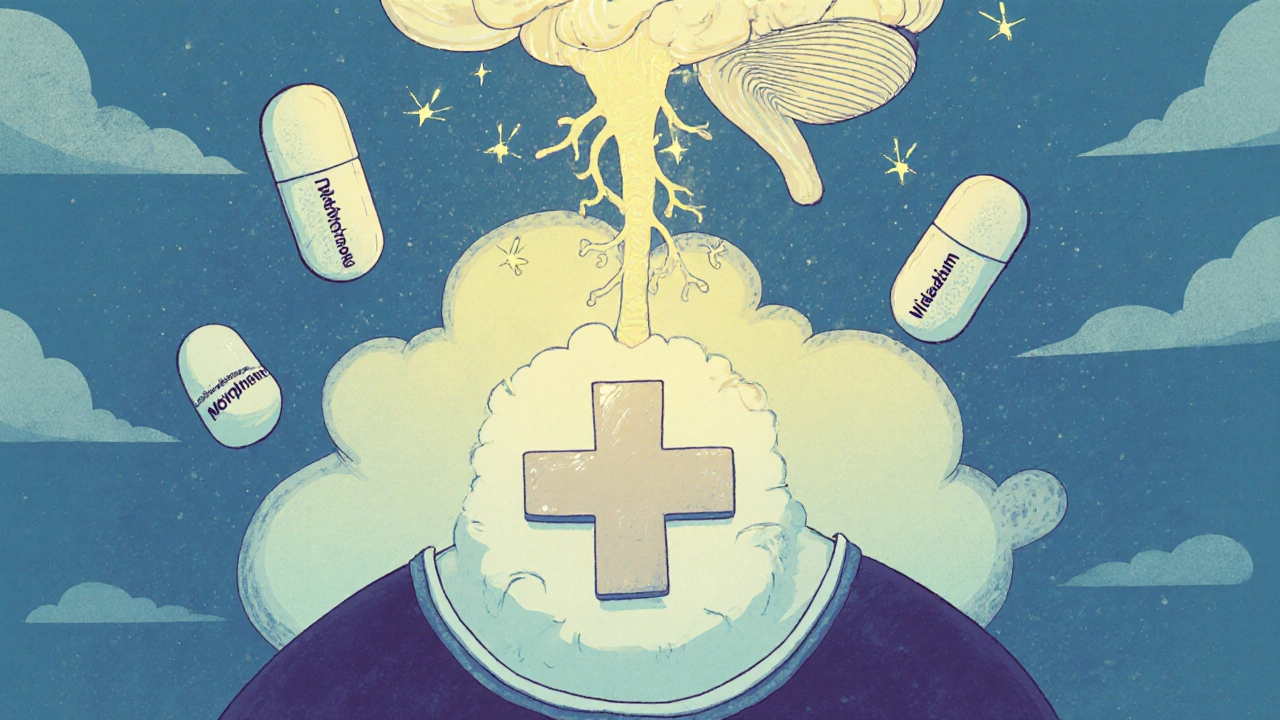Medication Hiccup Risk Checker
Check Your Medication Risk
This tool estimates hiccup risk based on medications described in the article. Always consult your doctor for medical advice.
Your Risk Assessment
This is for informational purposes only. Consult your healthcare provider for medical advice.
Most people think hiccups are just a funny, harmless annoyance-something that happens after eating too fast or drinking soda. But when hiccups stick around for days, or even weeks, and they’re linked to a medication you’re taking, they’re not funny anymore. They can ruin your sleep, make it hard to eat, and leave you exhausted. And here’s the thing: medication-induced hiccups are more common than you think, especially with certain drugs used in cancer treatment, pain management, or even steroid therapy.
Why Some Medications Make You Hiccup
Hiccups happen when the diaphragm spasms suddenly, and your vocal cords snap shut, making that classic "hic" sound. It’s a reflex controlled by nerves in your brainstem. But certain drugs mess with this system. They don’t just cause nausea or drowsiness-they can directly trigger the hiccup reflex arc. The biggest culprits? Corticosteroids like dexamethasone and prednisone. In one study, 41% of cancer patients on dexamethasone combined with chemotherapy got hiccups. Even a single 4mg dose can do it. How? These drugs seem to activate receptors in the brainstem that control the diaphragm. It’s not just about dose-some people are just more sensitive. Opioids like morphine are another major trigger. About 5-7% of chronic pain patients on opioids get hiccups. The theory? They slow down gut movement, causing gas and stomach distension, which irritates the vagus nerve. That nerve connects directly to the hiccup center in your brain. Then there are benzodiazepines like midazolam, often used before surgery. Around 8-12% of patients on these drugs report hiccups afterward. And antibiotics? Rare, but yes-moxifloxacin and azithromycin have been linked to cases, especially in people with existing lung conditions. The problem? Most drug labels don’t list hiccups as a common side effect. So when you start hiccuping after beginning a new med, your doctor might not connect the dots. That’s why up to 35% of cases get misdiagnosed as acid reflux, anxiety, or even a neurological issue.Who’s Most at Risk?
Men are far more likely than women to get drug-induced hiccups. In the dexamethasone-cisplatin studies, nearly all affected patients were male. Why? Researchers aren’t sure, but it might be hormonal or related to how men metabolize these drugs. People getting chemotherapy are especially vulnerable. Dexamethasone is routinely given to prevent nausea during chemo. But it’s also one of the most common triggers for hiccups in this group. If you’re on cisplatin or similar chemo drugs, your risk jumps dramatically. Older adults and those with existing nerve damage or neurological conditions are also at higher risk. Their nervous systems are more sensitive to drug interference.What to Do When Hiccups Start
If you notice hiccups starting within hours or days of beginning a new medication, don’t ignore them. The first step? Track it. Note the date you started the drug, the dose, and when the hiccups began. Did they get worse when you increased the dose? That’s a strong clue. Before jumping to conclusions, rule out other causes. Are you eating too fast? Drinking carbonated drinks? Have you been stressed? Sometimes, simple habits can mimic drug side effects. If the timing matches, talk to your doctor. Don’t stop the medication on your own-especially if it’s for cancer, pain, or a serious condition. But do ask: "Could this be the drug?"
Home Remedies That Actually Work
Before turning to more drugs, try these simple, science-backed tricks:- Swallow a teaspoon of granulated sugar. Sounds old-school, but a 2021 JAMA study showed a 72% success rate.
- Gargle ice water. The cold shock can reset the vagus nerve. Works about 65% of the time.
- Hold your breath for 10-20 seconds, then exhale slowly. Repeat a few times. This raises CO2 levels and calms the diaphragm.
- Drink water from the far side of the glass. It forces you to swallow differently, which can interrupt the reflex.
- Stimulate the back of your throat with a cotton swab. Gently. This can trigger a gag reflex that overrides the hiccup signal.
When You Need Medication to Stop the Hiccups
If home remedies fail and hiccups last more than 48 hours, you’re dealing with persistent hiccups. That’s when doctors step in with drugs. The only FDA-approved drug for hiccups is chlorpromazine (Thorazine). It’s an antipsychotic, but at low doses (25-50mg daily), it blocks dopamine receptors in the brainstem that trigger hiccups. It works in about half of patients. But it has side effects: drowsiness, low blood pressure, tremors. Not ideal for long-term use. Better first-line option? Baclofen. It’s a muscle relaxant that acts on GABA-B receptors in the brain. Studies show it resolves steroid-induced hiccups in 60-70% of cases. Start with 5mg three times a day. It’s generally well-tolerated and doesn’t cause the same sedation as chlorpromazine. Other options include gabapentin, metoclopramide, or nifedipine-but baclofen is the most reliable for drug-triggered cases.


Comments (13)
Denise Wiley
This article literally saved my life. My dad was on dexamethasone after his chemo and hiccuped for 72 hours straight-he couldn’t sleep, eat, or talk. We thought it was acid reflux until we found this. Baclofen worked like magic. Thank you for writing this.
Also, sugar trick? Pure genius. I tried it after reading this and his hiccups stopped in 90 seconds. No joke.
George Hook
While I appreciate the practical advice, I must point out that the mechanism described for corticosteroid-induced hiccups lacks sufficient neurophysiological specificity. The hypothesis that dexamethasone activates brainstem receptors controlling the diaphragm is plausible but oversimplified. There’s no direct evidence linking glucocorticoid receptor subtypes in the nucleus tractus solitarius to diaphragmatic spasm. The vagal irritation theory is more consistent with current literature, particularly when combined with gastric distension from opioid-induced motility suppression. Also, the JAMA sugar study was a small retrospective cohort-its 72% efficacy rate is promising but not generalizable without randomized controlled trials. I’d recommend cross-referencing with the 2020 Neurogastroenterology & Motility meta-analysis for a more nuanced view.
Skye Hamilton
Or maybe the hiccups are just your body screaming that the meds are poisoning you. You think it’s the drug? Nah. It’s the system. They don’t want you to know how many side effects these pills have. They just want you to keep taking them. Baclofen? That’s an old muscle relaxant repurposed because Big Pharma didn’t want to admit dexamethasone was a nightmare. And don’t get me started on chlorpromazine-antipsychotic for hiccups? That’s not science. That’s surrender.
jaya sreeraagam
As someone from India whose grandfather had chemo and got hiccups for 11 days, I can confirm this is real. We tried everything-holding breath, ice water, even chanting mantras (yes, really). Nothing worked until the doctor prescribed baclofen. I’m so glad this article mentions prophylaxis. My cousin is starting chemo next week and I’m already asking the oncologist for baclofen preemptively. If you’re on steroids or opioids, don’t wait until you’re exhausted-ask early. Your sleep, your peace, your dignity-all worth protecting. Also, sugar works. Don’t laugh. I’ve seen it with my own eyes. 1 tsp, swallow dry. Instant relief. Science meets grandma’s wisdom.
Olivia Gracelynn Starsmith
Great breakdown. I’m a nurse and we see this all the time. Patients come in frustrated because their doctor dismissed their hiccups as ‘just stress.’ The sugar trick is underrated. We keep a small container of sugar in every chemo bay now. Works faster than antiemetics sometimes. Baclofen is our go-to if it persists past 48 hours. Also-men are way more affected. I’ve seen 12 male patients with steroid hiccups and only 2 females. No idea why but it’s consistent. Don’t ignore it. It’s not ‘just hiccups.’
kaushik dutta
Let’s be real-this is a pharmacological failure of epic proportions. The FDA allows drugs with known CNS effects to be marketed without mandatory hiccup monitoring. We’re talking about a reflex arc disruption that impacts quality of life, sleep architecture, and nutritional intake. And yet, no black box warning? No mandatory reporting in Phase III trials until 2024? That’s not oversight. That’s negligence. The ICD-10 code R09.2 is a Band-Aid. What we need is a global registry. Pharma should be required to report hiccup incidence as a primary endpoint for all CNS-active agents. This isn’t anecdotal. It’s systemic. And if you’re a clinician ignoring this, you’re not practicing medicine-you’re performing triage on a sinking ship.
doug schlenker
I had this happen after my knee surgery. Midazolam before the procedure, then hiccups for 36 hours. No one connected it. I thought I was losing my mind. The ice water trick worked-gargling it felt like my throat was being reborn. I’m so glad this article exists. It’s not just about the meds-it’s about how we dismiss symptoms that don’t fit the ‘textbook’ mold. Hiccups aren’t funny when they steal your sleep. Thank you for validating what so many of us feel alone with.
Nicola Mari
Anyone else notice how every single remedy here is either sugar, ice, or breath-holding? No wonder people think modern medicine is useless. If you need a teaspoon of sugar to fix a drug side effect, maybe we shouldn’t be giving the drug in the first place. This is just another example of how we treat symptoms instead of causes. And now we’re prescribing baclofen to fix what chlorpromazine was supposed to fix? It’s turtles all the way down. You’re all just playing whack-a-mole with pharmaceuticals.
Brandon Trevino
Statistical anomaly alert: The claim that 41% of dexamethasone recipients develop hiccups is cherry-picked from a single oncology cohort with cisplatin co-administration. The true incidence in non-chemo populations is closer to 2–5%. The article conflates synergistic toxicity with monotherapy effects. Furthermore, the 72% sugar efficacy rate derives from a non-blinded, non-placebo-controlled pilot study with n=25. The statistical power is inadequate. The recommendation to use baclofen prophylactically lacks Phase IV validation. This is not evidence-based medicine-it’s anecdotal advocacy dressed in JAMA citations. Readers should exercise extreme caution before altering clinical regimens based on this.
Maria Romina Aguilar
…and yet… nobody mentioned the fact that hiccups are also linked to… *drumroll* …emotional suppression. Have you ever thought that maybe… the body is trying to *communicate*? The sugar? The ice? The breath? They’re all… distractions. From the truth. The meds aren’t the problem. The silence is. You’re not hiccuping because of dopamine. You’re hiccuping because you’re not allowed to feel. And now you’re on baclofen to numb the body… while ignoring the soul.
Hannah Magera
So if I start a new med and get hiccups, I should try sugar first? That’s it? No doctor visit? Just swallow a spoon and hope? I’m confused. What if I’m diabetic? What if I’m on blood thinners? What if I’m a kid? This feels like a TikTok hack passed off as medical advice. I love the effort, but can we get some clear guidelines? Like, ‘If hiccuping >24h AND started within 72h of new med → consult doctor AND try sugar + ice water while waiting.’ Not ‘try sugar and feel better.’ That’s not a plan. That’s a gamble.
Austin Simko
They know. They always know. Hiccups are the body’s alarm system. The government and Big Pharma don’t want you to know how often drugs cause this. That’s why the ICD code was added in 2024-so they could track it without fixing it. Baclofen? That’s a placebo with a prescription. They’re just buying time until the next drug comes out. Watch the ads. They never mention hiccups. Never.
Katrina Sofiya
This is exactly the kind of information we need to share more widely. I’m so proud of the author for bringing attention to something so many suffer in silence with. I’ve had patients cry to me because their doctor told them it was ‘just anxiety.’ You’re not crazy. You’re not imagining it. Your body is speaking-and now we have tools to listen. Try the sugar. Try the ice. Talk to your provider. And if they don’t take you seriously? Find someone who will. You deserve to feel well-not just survive.